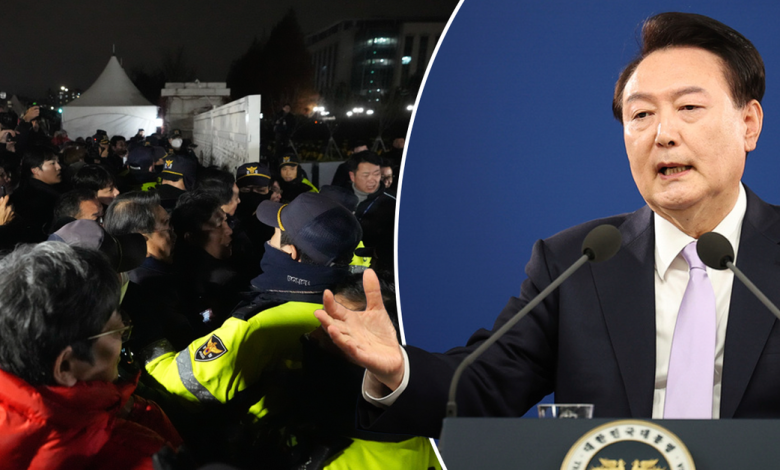President Yoon Suk Yeol makes declaration

Hours later, after midnight on Wednesday, parliament voted to revoke the declaration, with National Assembly Speaker U Won Shik saying lawmakers “will defend democracy with the people.” Wu called for police and military personnel to withdraw from the Assembly grounds.
The president’s surprise move harked back to an era of authoritarian leaders the likes of which the country has not seen since the 1980s, and was immediately condemned by the opposition and the leader of Yun’s own conservative party.

Following Yoon’s statement, the South Korean military announced that parliament and other political gatherings that could cause “social confusion” would be suspended, according to South Korea’s Yonhap news agency.
The military also said striking doctors in the country must return to work within 48 hours, Yonhap said. Thousands of doctors have been on strike for months over government plans to increase student numbers at medical schools. The military said anyone violating the decree could be arrested without a warrant.
Under South Korean law, martial law can be lifted by a majority vote in parliament, where the opposition Democratic Party has a majority.
Soon after the declaration, the Speaker of the National Assembly called in an emergency statement posted on his YouTube channel for all MPs to gather in the National Assembly building. He urged the military and law enforcement to “remain calm and hold their positions.
All 190 deputies who took part in the vote supported the lifting of martial law. Television footage showed soldiers who had been stationed in parliament leaving the venue after the vote.

Earlier, television showed policemen blocking the entrance to the National Assembly and soldiers with helmets and rifles in front of the building to restrict entry into the building.
An Associated Press photographer saw at least three helicopters, possibly from the military, land on the Assembly grounds, while two or three helicopters circled the site.
The leader of Yun’s conservative People’s Power Party, Han Dong-hun, called the decision to impose martial law “wrong” and vowed to “stop it with the people.” Opposition leader Lee Jae-myung, who narrowly lost to Yoon in the 2022 presidential election, called Yoon’s announcement “illegal and unconstitutional.”
Yun said in a televised speech that martial law would help “restore and protect” the country from “falling into the depths of national ruin.” He said he would “eradicate pro-North Korean forces and protect the constitutional democratic order”.
“I will eliminate the anti-state forces as quickly as possible and normalize the country,” he said, urging people to trust him and tolerate “some inconvenience.”
Yun – whose approval rating has fallen in recent months – has struggled to push his agenda against an opposition-controlled parliament since taking office in 2022.

Yun’s party is deadlocked with the liberal opposition over next year’s budget bill. The opposition also tried to push through motions to impeach three top prosecutors, including the head of the Seoul Central District Prosecutors’ Office, in what conservatives called a vendetta against their criminal investigations into Lee, who was seen as the favorite for the next presidential election in 2027. according to sociological surveys.
Yun has also rejected calls for independent investigations into scandals involving his wife and senior officials, prompting swift and strong rebukes from his political rivals. The Democratic Party reportedly called an emergency meeting of its lawmakers following Yun’s statement.
Yun’s move is the first declaration of martial law since the country’s democratization in 1987. The last previous martial law in the country was in October 1979.




